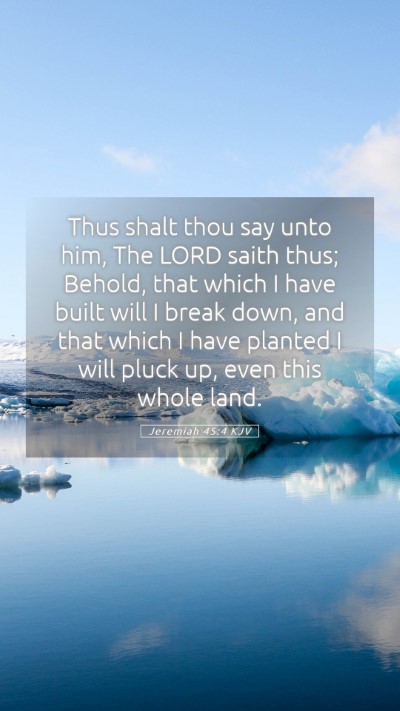Understanding Jeremiah 45:4
In this section, we provide a comprehensive analysis and biblical commentary on Jeremiah 45:4, exploring its meaning, context, and application for modern readers. This verse states:
"Thus shalt thou say unto him, The Lord saith thus; Behold, that which I have built will I break down, and that which I have planted I will pluck up, even this whole land."
Context of the Verse
Jeremiah 45:4 is part of a larger narrative where the prophet Jeremiah communicates God's judgment on the nation of Judah. This particular verse is directed at Baruch, Jeremiah's scribe and loyal companion, who was distressed by the prophecies of destruction. Understanding this context is crucial for interpreting the verse correctly.
Bible Verse Interpretations
-
Matthew Henry:
Henry highlights that this verse offers a solemn warning regarding the transitory nature of human plans and ambitions. It underscores God's sovereignty, illustrating that despite Baruch's efforts and the actions taken to establish stability, God's will to bring down what seems unassailable will prevail.
-
Albert Barnes:
Barnes elaborates that the devastation mentioned not only applies to the geopolitical situation of Judah but also emphasizes the fragility of human endeavors in the face of divine authority. The emphasis is on God's right to intervene and alter the course of events as He sees fit.
-
Adam Clarke:
Clarke interprets the phrase "I have built… I will break down" as a direct declaration of God's power over the fate of nations and individuals alike. He warns that all efforts that oppose God's will are ultimately doomed to failure, and highlights the need for faithfulness in the face of impending calamity.
Key Themes and Insights
- God's Sovereignty: This verse affirms the belief that God is in control of creation and human affairs. His plans are paramount over any human blueprint.
- Transient Nature of Earthly Foundations: Reflecting on the verse encourages believers to reconsider where they place their trust and values, as all earthly constructs are subject to God’s will.
- The Call to Faithfulness: Despite the looming destruction, the call remains for individuals like Baruch to maintain their commitment to God’s word and purposes.
Applying the Verse to Daily Life
In both personal and communal contexts, this verse encourages us to evaluate our lives through the lens of God’s eternal perspective. It serves as a reminder that no matter how secure or strong our plans may seem, they must align with God’s purposes to endure.
Related Bible Verses
- Isaiah 40:8: "The grass withers, the flower fades, but the word of our God will stand forever."
- Proverbs 19:21: "Many are the plans in a person's heart, but it is the Lord's purpose that prevails."
- Romans 9:17: "For the Scripture says to Pharaoh: 'I raised you up for this very purpose, that I might display my power in you and that my name might be proclaimed in all the earth.'
Conclusion
Jeremiah 45:4 encapsulates critical themes of divine authority and the nature of human endeavors. This verse, along with insights from public domain commentaries, provides a rich basis for Bible study insights and engagement in study groups or personal reflection.


